👨🏼💻 Julian Assange: The Character Behind the Controversy


Morning all,
In a few days time, WikiLeaks founder Julian Assange is set to marry Stella Moris in England's Belmarsh prison.
During the extraordinary and secret relationship, the pair had two children - all whilst Assange was living in asylum in the Ecuadorian Embassy.
Even if married, the couple face an uncertain future - with Assange fighting extradition to the US, where he could face a sentence of up to 75 years in prison.
He is a person we've been asked repeatedly to profile, so what better time to do it.
Until Monday,
Your Fixers
EARLY LIFE
Let's go back to 1971. On July 3, Julian Paul Assange was born in Townsville, northern Australia.
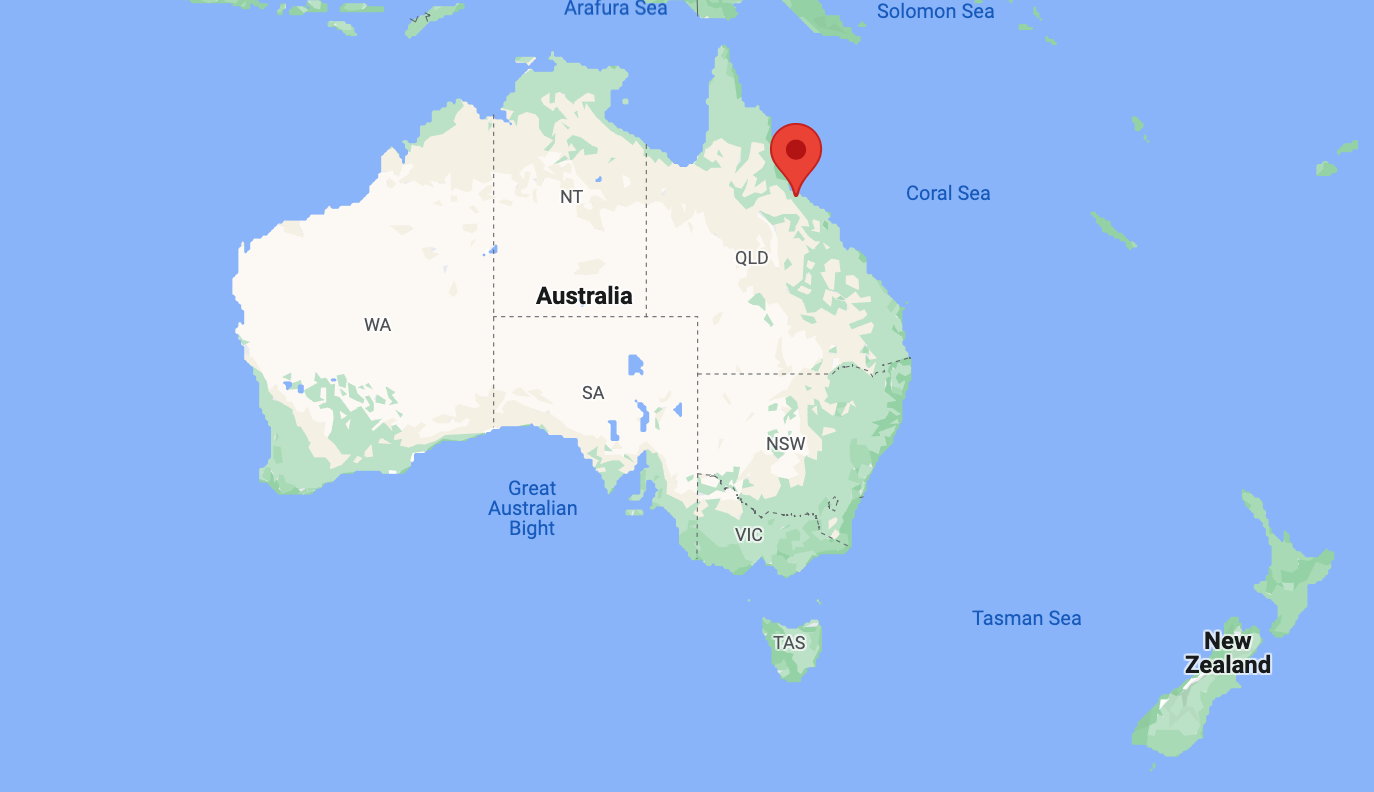
His mother Christine - who was separated from his biological father when he was born - remarried when Julian was a year old to Brett Assange, who later adopted him.
Growing up, the family moved around frequently. At the age of 18, Assange fathered a child and spent years trying to secure custody. His mother once claimed it was the stress from this that turned his hair grey at a young age.
HACKING
As a teenager, Assange displayed skill and interest in computer programming and hacking.
Going by the name 'Mendax' - and alongside two co-conspirators - Assange infiltrated computer systems including NASA and the Pentagon. At the age of 21, he was charged with 31 counts of computer hacking and related crimes.
He pleaded guilty and was fined several thousand Australian dollars for cybercrime. He avoided jail on the basis he would not reoffend.
WIKILEAKS
After finishing school, Assange studied physics in Melbourne - but withdrew before completing the degree. He went on to work as a computer security consultant.
Assange had registered the domain name ‘wikileaks.org’ in 1999, but it was not until 2006 that he began actively using it.
Wikileaks describes itself as a “multi-jurisdictional public service designed to protect whistleblowers, journalists and activists who have sensitive materials to communicate to the public”.
Assange has characterised this as “scientific journalism” - in which primary source materials are provided with a minimum of editorial commentary.
“I want to set up a new standard: ‘scientific journalism.’ If you publish a paper on DNA, you are required, by all the good biological journals, to submit the data that has informed your research—the idea being that people will replicate it, check it, verify it. So this is something that needs to be done for journalism as well.” - Julian Assange, 2010
THE LAUNCH
The first Wikileaks publication was in 2006, and featured a message (never verified) from a Somali rebel leader encouraging the use of hired gunmen to assassinate government officials.
It didn’t attract a great deal of attention.

'HARRY'
That same year, according to a report in The Guardian, Assange set up a dating profile in Australia - under the pseudonym ‘Harry Harrison’.
“WARNING: Want a regular, down to earth guy? Keep moving ... I am DANGER, ACHTUNG!" - Julian Assange’s dating profile
On the profile, Harry stated he was “professionally involved in international journalism/books, documentaries, cryptography, intelligence activities, civil rights, political activism, white collar crime and the internet".
Harry described himself as “a pig-headed activist intellectual”, and noted that he was searching for a "love affair, children and occasional criminal conspiracy".
At the time, Assange was living in a student house in Melbourne, planning the formal launch of WikiLeaks.
US LEAKS
And so in 2007, Assange did indeed announce the formal launch of Wikileaks. The site began publishing scoops on subjects including Guantanamo Bay - the US military prison in Cuba - and a membership roster of the British National Party, detailing more than twelve thousand members.
The site really made headlines in April 2010.
Wikileaks published a video - reportedly from 2007 - which showed a US airstrike that allegedly targeted and killed Iraqi civilians, including two children and two Reuters journalists.
Soon after, in May 2010, Assange vanished. It was reported the US State Department was searching for Assange.
As James Ball, who worked for WikiLeaks recalled, Assange “stayed dressed up as an old woman for more than two hours” on occasions - trying to avoid potential pursuers.
PRIVATE MANNING
As Assange continued with his evasion, American officials arrested a US Army Private they accused of providing the files to Wikileaks. That Private was Bradley Manning - who later transitioned and changed her name to Chelsea Manning.

Manning was charged with espionage offences and sentenced to 35 years in prison in 2013. However, President Obama shortened her sentence upon leaving office, and Manning was later released from prison in 2020.
HIGH-TECH TERRORIST
Going back to 2010, WikiLeaks followed up the leaked video by publishing more documents provided by Manning - including 450,000 classified military reports and files. They were published in conjunction with the Guardian.
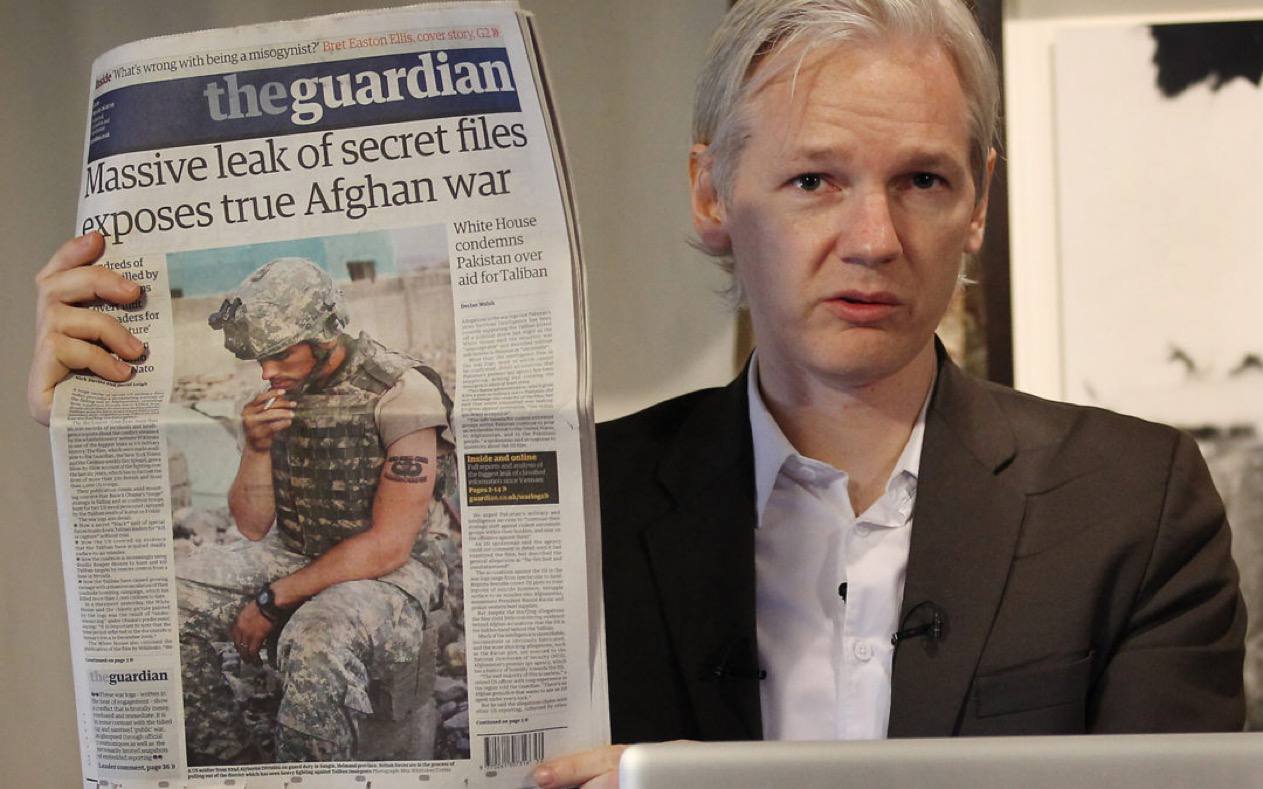
The leaked documents ranged in topic - but most notably included information on the US wars in Iraq and Afghanistan, and its efforts to isolate Iran.
"A huge cache of secret US military files today provides a devastating portrait of the failing war in Afghanistan, revealing how coalition forces have killed hundreds of civilians in unreported incidents, Taliban attacks have soared and Nato commanders fear neighbouring Pakistan and Iran are fuelling the insurgency." - The Guardian report in 2010
In the US, many politicians condemned the publications. Joe Biden - then vice president - likened Assange to a “high-tech terrorist”.
At the time, Sarah Palin asked “why was he not pursued with the same urgency we pursue al Qaeda and Taliban leaders?”.
However, as The Washington Post put it - “what so many politicians condemned, so much of the public celebrated”. He was simultaneously voted celebrity-of-the-year by a number of magazines, gave a TED talk and was interviewed for TV.
PERSONALITY
Politicians may have condemned Assange, while some of the media and public had an affinity for him. But what is his true character like?
Well, Assange is reported to have a strong sense of humour, but is also said to sometimes struggle with social skills. This has led some to ask if he is on the autistic spectrum. Assange has reportedly replied ‘aren’t all men?’.
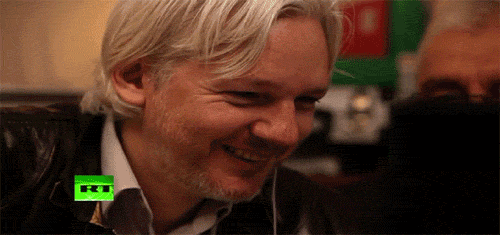
But it seems Assange can also be a difficult person to get along with. Many collaborators have fallen out with him - and he has been accused of getting angry, and having “callous disregard” for those he disapproves of.
In 2010 - the same year WikiLeaks published the US documents mentioned above - truly concerning allegations regarding his behaviour arose.
RAPE AND SEXUAL ASSAULT ALLEGATIONS
Assange was accused by two Swedish women of rape and sexual assault - which he denied under claims that it was consensual.
Sweden issued an international arrest warrant for the Wikileaks founder, and he was detained in the UK and later granted bail.
Assange appealed a UK court decision to extradite him to Sweden - arguing this could lead to prosecution in the US, and potentially the death penalty.
He said the proceedings were "an attempt to get me into a jurisdiction which will then make it easier to extradite me to the US”. Swedish prosecutors denied the case had any relation to WikiLeaks.
That same year he was awarded the Sydney Peace Foundation’s gold medal for “exceptional courage in pursuit of human rights”. The award was previously given to Nelson Mandela and the Dalai Lama.
The extradition case ended up at the UK Supreme Court - which ruled against Asssange’s appeal. Resultantly, Assange took refuge in the Ecuadorian Embassy in London, and was granted political asylum there in August 2012.
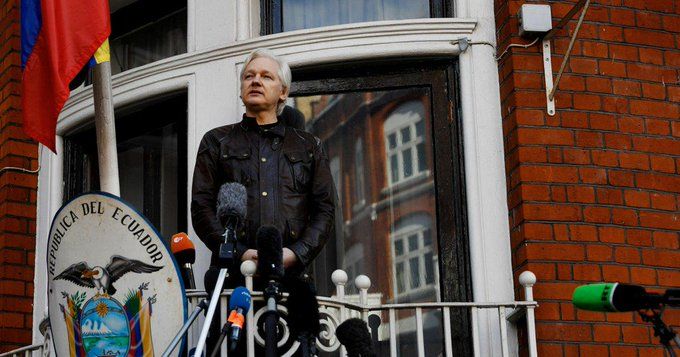
LIFE IN THE EMBASSY
Whilst living in the embassy, Assange lived in the same small room for seven years - unequipped for a long-term stay. He also had no access to a shower in the first few weeks.
From the embassy, Assange launched his political career. He founded the WikiLeaks Party and stood for a seat in the Australian Senate. However, the party performed poorly, and failed to win any seats.

It later emerged that from 2015 while Assange was living in the embassy, he was in a relationship with a lawyer called Stella Morris. The couple had two children together while living in the embassy - and are getting married on March 23.

THE US ELECTION
Assange became a prominent figure during the 2016 US presidential election campaign, This was because WikiLeaks published a variety of internal documents from the Clinton campaign and the Democratic Party.
Responding to the publications, Clinton campaign spokesman Glen Caplin said;
“We are not going to confirm the authenticity of stolen documents released by Julian Assange who has made no secret of his desire to damage Hillary Clinton.”
A US intelligence report from 2017 - later declassified - found that Assange had been part of a sophisticated hybrid warfare campaign orchestrated by Russia against the US.
Assange responded to the allegations - saying “our source is not the Russian government and it is not a state party”.
WITHDRAWAL OF ASYLUM
In 2017, Swedish prosecutors discontinued their investigation into the allegations of rape and sexual assault, saying it was impossible to proceed with Assange in the Ecuadorean Embassy.
Despite this, Assange was still wanted for failing to appear in British court - and in the US, which still wanted to extradite him for computer crimes.
Back when Assange was granted asylum in the embassy, it was under former Ecuadorian President Rafael Correa. However, Correa was succeeded by Lenin Moreno in 2017 - who held a different view.
He revoked Assange’s asylum status in 2019 - with one reason being Assange’s reportedly disruptive behaviour in the embassy. Accusations included that he behaved aggressively towards staff, and even reportedly smeared faeces on the walls of the embassy.
British police were able to enter the embassy in April 2019 - and arrested Assange.

Correa has strongly condemned his successor’s decision to hand Assange over to the authorities, stating that “scoundrel and betrayal can be summarised in two words: Lenin Moreno".
IMPRISONMENT AND FURTHER CHARGES
After his arrest, in May 2019, Assange was sentenced to 50 weeks in prison - after being found guilty of breaching his bail conditions.
Soon after that, Swedish prosecutors reopened the rape and sexual assault allegations case - but not long after announced they were dropping the case again.
Meanwhile, the US filed 17 new charges against Assange for violating the Espionage Act and he has been fighting extradition since. If he is tried in the US, he could be sentenced to up to 175 years in prison.
HEALTH CONCERNS
While Assange was in prison, In November 2019, more than 60 doctors from around the world wrote an open letter to British home secretary Priti Patel expressing major concern about Assange’s health.
The letter argued he should be transferred from Belmarsh prison where he was being held under such poor conditions that they feared for his death.
It was penned following a court appearance one month prior, in which Assange had appeared frail and “confused”, had difficulty remembering his own birthday, and seemed unable to understand what had occurred in court.
In January 2021, a British judge ruled Assange should not be extradited to the US because "he would be at risk of suicide". The US appealed that ruling.
SUPPORTERS
Throughout the protracted legal process, Assange has amassed a wide range of supporters - including Jeremy Corbyn, Noam Chomsky and Edward Snowden.

One supporter, Pamela Anderson, described him as “an incredible person” and said “he believes in justice, believes in honesty, believes in exposing governments for what they’re really doing”.
Below is a really interesting TV appearance by Pamela Anderson on The View in 2019 - where Republican panelist Meghan McCain, in particular, got quite heated. It is one of the clearest examples of just how polarising a figure Assange is, and just how divided many in the US are when it comes to this subject.

US POLITICS
President Obama had been reluctant to indict Assange - in part due to the obvious challenge this would pose to the freedom of expression i.e. the First Amendment.
Reportedly, his administration was also concerned it could be viewed as an attack on journalism.
However, the Trump administration had a different view - with then-Attorney General Jeff Sessions saying soon after his appointment that the arrest of Assange was a priority.
In September 2021, Yahoo published an explosive report, alleging that in 2017 the CIA discussed plots to kidnap or kill Assange. A former counterintelligence officer was quoted as saying the discussions occurred "at the highest levels" of the Trump administration.
Current US President, Joe Biden, has been urged by groups such as Amnesty International to drop the ‘politically-motivated’ charges against Assange, and efforts to extradite him. However, these remain ongoing.
“If extradited to the US, Julian Assange could face trial on 18 charges… he would also face a real risk of serious human rights violations due to detention conditions that could amount to torture or other ill-treatment, including prolonged solitary confinement. Assange is the first publisher to face charges under the Espionage Act.” - Amnesty International
THE LATEST
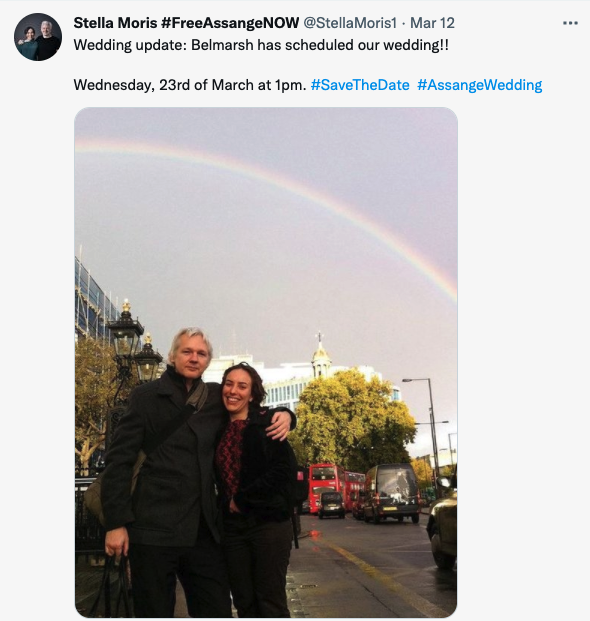
Despite the threat of extradition, Assange and his partner - lawyer Stella Moris - are expected to marry in Belmarsh Prison on Wednesday, March 23rd. He has Scottish heritage, and will be wearing a kilt designed by Vivienne Westwood - another supporter of his.
On March 14, the UK Supreme Court refused to allow Julian Assange his latest appeal against being extradited to the US. It is viewed as a major blow to his hopes to avoid extradition - but his lawyers say he has not ruled out making a final appeal.
In any case, the final decision on his extradition will lie with UK Home Secretary, Priti Patel - who would have to sign off.
As always, we will keep an eye on any developments.
Thank you for reading! If you enjoy our free NewsFix content, the best way you can support us is by telling friends and spreading the word ✌🏽
